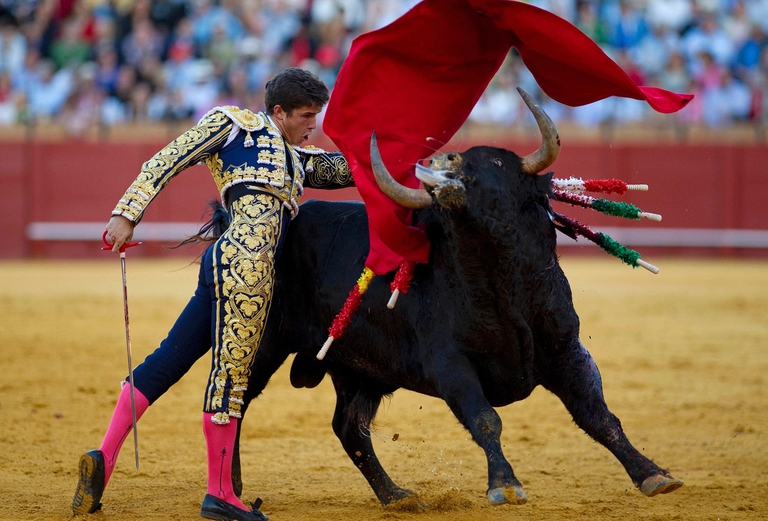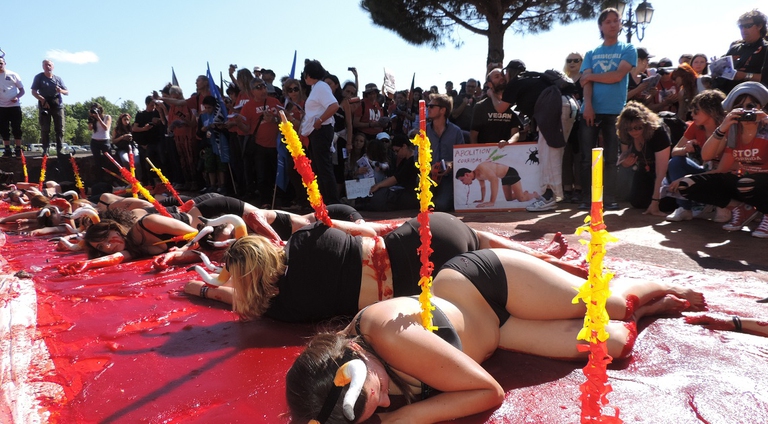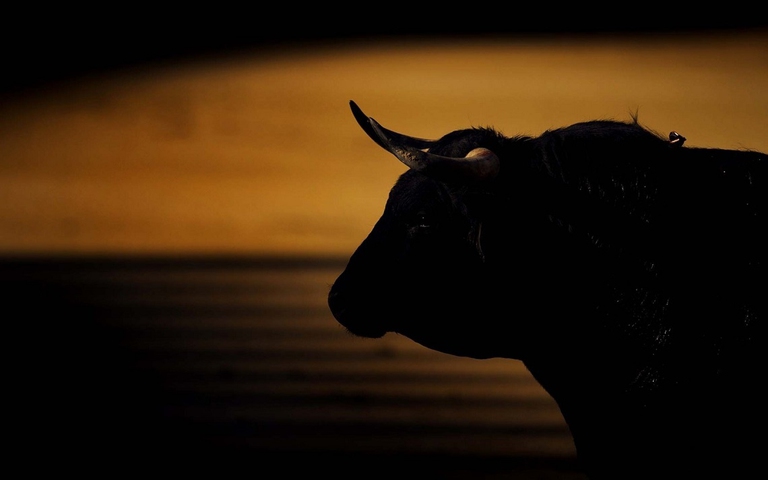
Il comune di Madrid ha finalmente deciso di vietare gli spettacoli di circo “con esibizione di animali selvatici”.
Il Parlamento europeo ha deciso di eliminare i fondi destinati agli allevamenti di tori per la corrida.
Drugs and purgatives, blows with sandbags, smoothed horns to increase pain sensitivity, turpentine on paws, vaseline on the nose and in the eyes, pins in skewered in testicles.
These are only some of the tortures bulls undergo before entering the arena to participate to what is defined a “folkloristic show of cultural interest”, the bullfighting.
On Wednesday 28 October we’ve finally arrived at a turning point. With 438 votes in favour and 199 against, the European Parliament has approved an amendment to cut subsidies to bullfighting.
The decision has arrived after years of protests. For example, the Italian association Animalisti Italiani Onlus launched in 2013 a campaign against bullfighting and waste of European public money, underlining how subsidies that should be destined to support agriculture actually contribute to torture and kill at least 40,000 bulls each year.
Last year, a similar amendment was vetoed because it didn’t reached the quorum. The 58 parliament members who abstained thus allowed the approval of subsidies. Despite the EU has cut the funds, Spain continues to claim the cultural, traditional value of bullfighting. It is thus possible that it will overcome the lack of European subsidies by using its own budget.
However, figures suggest a decline in this barbarity: 72% of Spanish people is in favour to abolish bullfighting, which is now a “show” fuelled exclusively by tourists.
There’s still a long way to go, as there are numerous rooted celebrations exploiting different animal species all over Europe. However, there’s an ongoing change and one day we won’t need to inflict pain and death to enjoy ourselves any more.
Siamo anche su WhatsApp. Segui il canale ufficiale LifeGate per restare aggiornata, aggiornato sulle ultime notizie e sulle nostre attività.
![]()
Quest'opera è distribuita con Licenza Creative Commons Attribuzione - Non commerciale - Non opere derivate 4.0 Internazionale.
Il comune di Madrid ha finalmente deciso di vietare gli spettacoli di circo “con esibizione di animali selvatici”.
Il governo spagnolo ha annunciato di voler rinunciare al progetto di dragaggio del fiume Guadalquivir, salvando così l’area umida del Parco Nazionale Doñana.
The third edition of the international conference Greening the Islands will focus on two major issues: migration and climate change.
Homecast is a podcast series recorded in quarantine in which creatives from around the world share their lived experiences of these unique circumstances. Creator Giacomo De Poli tells us why this collective diary was needed now more than ever.
Il ventinovenne Victor Barrio è stato ferito a morte da un toro durante una corrida, è il primo incidente mortale dal 1985.
The cycling lane network in Barcelona will increase from 116 to 308 km in three years with an investment of 32 million euros. The urban mobility plan also aims to create new bike parking lots.
Seville dreams big about cycling mobility, in the wake of the actions undertaken by cities like Nantes or Lubiana; so, not exclusively Northern Europe can invest adequately in bicycles as the means of transport of the future. Figures on bike infrastructures in Seville From 2006 to 2011, in the Spanish city the number of cyclists increased tenfold,
Ingredients for 6 servings 300 g of diced stale bread 1.5 kg of ripe round tomatoes 6 spoonful of extra virgin olive oil 2 or 3 cloves of garlic 1/2 kg of cucmbers 1 onion 3 green peppers 1 litre of fresh water salt red wine vinegar For garnishing: 2 diced ripe tomatoes
Vortex could represent a revolution in wind energy sector. It is still a prototype, but the Spanish startup launched a crowdfunding campaign.










